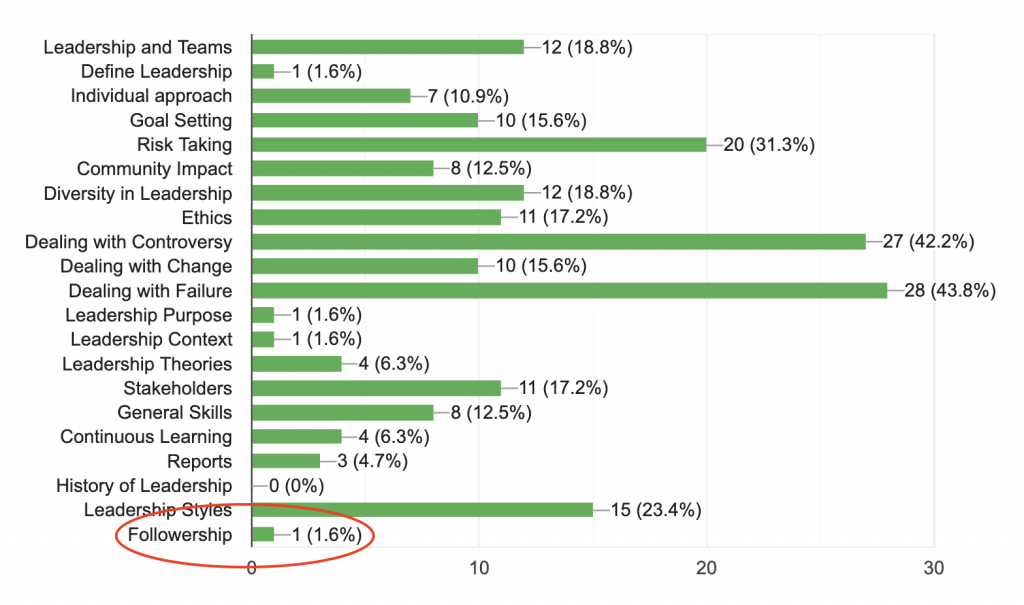Leadership Research Project: What is Followership?
Introduction
As my team and I set out to begin analyzing the responses from the Leadership Course Survey that we sent out to our colleagues, I began taking note of natural groupings of topics. I noticed that our colleagues’ interests could be broken down into 3 simple categories: those topics related to theory or background knowledge of leadership, those topics related to basic level leadership skills, and those topics related to advanced level leadership skills. Our colleagues showed very little interest in the first category and were only somewhat interested in the second category. However, I noticed that a majority of people expressed interest in the third category.

Upon coming to this conclusion, I decided to take one last look through our findings to confirm whether this conclusion was an accurate one. It was during my final scan that I found one topic that didn’t seem to fall in line with the trend of the survey results, and this topic was Followership. Only one person expressed interest in this topic, which should mean that Followership is relatively unimportant and belongs to the category of theory or background knowledge. This however is not true as Followership is neither. My guess was that people were apprehensive about selecting this topic on the survey because they just weren’t familiar with the term. I admit that it was only through the research that my team and I did for this project that I first came upon this term. I decided I wanted to learn more.
What is Followership?
So, what exactly is followership? According to Ivey Business Journal, “Followership…[i]s the ability to take direction well, to get in line behind a program, to be part of a team and to deliver on what is expected of you.” For those that were taught from a young age that they should strive to be leaders not followers, this definition might feel like a bit of a departure from the negative connotation they’ve attached to followership since childhood. The way Ivey Business Journal puts it, good followership skills are well sought after as a good follower will one day become a good leader. Only one that knows how to play his or her part in fulfilling an organization’s mission statement can one day learn how to lead that charge.
What makes a good follower?
In the article “Followership: The Other Side Of Leadership”, McCallum states that there are eight qualities that make a good follower and they are the following:
- Judgement – Good followers must have good enough judgement to know when and when not to follower their superiors.
- Work Ethic – Good followers have a good work ethic. Bad workers are not good followers.
- Competence – Good followers have the necessary skills and knowledge to complete the tasks they’ve been entrusted with.
- Honesty – Good followers know when they need to be candid with their bosses to point out flaws in the strategies of leadership.
- Courage – Good followers are courageous enough to be honest.
- Discretion – Good followers know to keep to themselves sensitive information they know about their leaders and their organizations.
- Loyalty – Good followers are loyal to their leaders’ and organizations’ objectives.
- Ego Management – Good followers are team players and know how to work with others to accomplish a common end goal.
As we can see from this list, there is much more to this concept of followership than one who lacks independent thought and who blindly listens to those in positions of authority.
Why is good followership crucial to good leadership?
A good leader is not successful in his or her endeavors without having a solid team. Without good followers supporting their leaders and their vision for their team and the organization at large, these leaders would fall short. After a follower has had enough experience being a highly functioning member and contributing to a team’s success, he or she will then be equipped with the proper skills and knowledge to then lead said teams.
Individuals with strong followership skills:
- Get things done
- Are great team players
- Know how to align themselves with their leaders’ objectives
- Have the insight and the courage to be honest when they see flaws in operational strategies
So now the question begs itself: when you hear the words follower or followership, will you continue to think of a mindless creature that just follows along without any critical thought? Or will you think of an individual who plays an integral role in contributing to an organization’s success? Don’t hire lemmings.

Source:
McCallum, John. Follower: The Other Side Of Leadership. Ivey Business Journal, September/October 2013.
Learn More
If you would like to learn more about our research project and some of our takeaways from it, feel free to check out the following posts from other members of the team.
Jacobsen Miller – Leadership Research Project
Jie (Stefan) Zhao – Leadership and Failure
Tianlin (Lynn) Li – Leadership and Risk Taking
This research project would not have been as meaningful and insightful as it was without the exemplary work of my colleagues Tianlin Li, Jacobsen Miller, and Jie Zhao. Kudos to you all!


